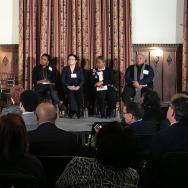“I did not come here to celebrate.” So began the Rev. Dr. William J. Barber II’s keynote address to a captivated audience gathered to honor the legacy and life of Dr. Martin Luther King Jr.
“I think we’re in a time that we cannot merely celebrate our leaders of the past. We must imitate, we must reimagine and we must embrace,” said Barber, a social justice advocate and MacArthur fellow whose work included starting “Moral Monday” rallies in North Carolina to protest issues such as voter suppression and cuts in education funding.
Barber spoke on Jan 15 at the University of Chicago’s annual commemoration of Dr. King, which was held at Rockefeller Memorial Chapel, where King twice spoke —in 1956 and 1959. In his remarks, Barber echoed the civil rights leader’s final sermon, given less than 24 hours before King’s death, saying: “Nothing would be more tragic than for us to turn back now.”
Barber reminded the audience that the key to not turning back is remembering that King’s words, inspiring to so many, grew upon a foundation of action and civil disobedience. “It’s such a misnomer to talk about his oratory and not his action. He called forth a movement—not just within the black community, but within the streets of the nation,” Barber said.
Since its inception in 1990, the UChicago’s annual commemoration has featured prominent speakers, including President Barack Obama, the Rev. Jesse Jackson and educator/activist Angela Davis. The event also provided an opportunity to recognize the recipients of the University’s Diversity Leadership Awards, given each year to UChicago faculty, alumni and staff who have made a significant impact in advancing diversity and social justice.











 —Prof. Kunle Odunsi
—Prof. Kunle Odunsi
